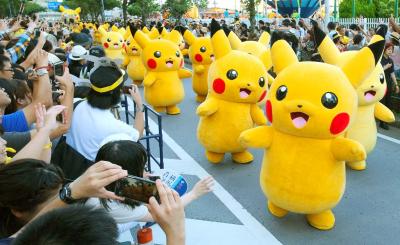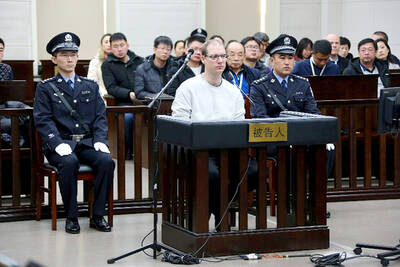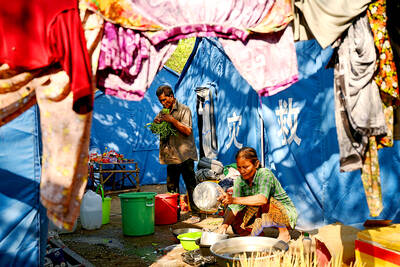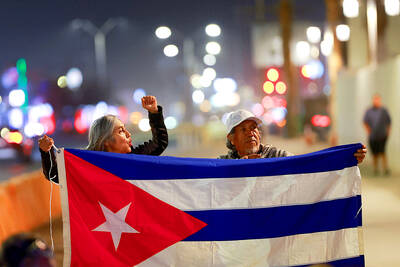To hear North Korea's state media tell it, in the midst of an inferno of exploding rail cars and dying children, several heroic women made the ultimate sacrifice, running into blazing buildings in frantic attempts to save treasured portraits of Kim Jong-il and his late father, Kim Il-sung.
"Many people of the county evacuated portraits before searching after their family members or saving their household goods," the Korean Central News Agency wrote approvingly from Ryongchon, the railroad town where a huge explosion killed at least 161 people and wounded 1,300 last week.
"They were buried under the collapsing building to die a heroic death as they were trying to come out with portraits of President Kim Il-sung and leader Kim Jong-il," it said.
In North Korea, where the state personality cult is stronger than in Mao Zedong's (
A staple of North Korea's propaganda mythology, tales of people sacrificing themselves for portraits of Kim Jong-il, known as the Dear Leader, are being reissued at a time when speculation unleashed by the explosion is swirling.
For starters, where is the Dear Leader?
One week after the blast, the state media has not chronicled any new doings by North Korea's secretive leader. Admittedly, Kim lives a Wizard of Oz existence. In his 30 years of political life and 10 years as supreme leader, he is not known to have given a public speech. To prevent assassination attempts, the North Korean media never give clues as to where he is or will be.
On April 21, Chinese state television reported that he had just left Beijing for home; everyone knows it is a 12-hour train ride to Pyongyang.
South Korean reports said his train passed through Ryongchon before dawn on Thursday, about eight hours before the blast.
In the days after the blast, reporters in Dandong, on the Chinese border, said Kim's entourage had been joined by a decoy train when he crossed the border into North Korea, a standard safety precaution.
Another nagging question: what caused the blast? Without citing a source or witness, KCNA, the North Korean news agency, said the "explosion was caused by the contact of electric lines during the shunt of wagons loaded with nitric ammonium fertilizer and tank wagons." This explosion, KCNA said, was "equivalent to the blast of about 100 bombs each weighing one tonne."
How that information could be known remains unclear. Photographs and accounts of foreign aid workers allowed to tour the scene give a picture of total devastation, deep craters surrounded by hundreds of yards of debris and desolation. It is unlikely that any witness to the ignition could have survived the blast.
Children accounted for almost half the death toll. About 500 of the 1,300 people wounded were blinded; scores of them were children, according to foreign aid workers who toured hospital wards in Sinuiju, the regional center. Some analysts have speculated that the children might have been lined up to wave at the train of a passing dignitary.
"So let's ask why half the casualties were kids and why so many of them have facial/eye injuries," Robyn Lim, a conservative military analyst in Japan, wrote.

China’s military news agency yesterday warned that Japanese militarism is infiltrating society through series such as Pokemon and Detective Conan, after recent controversies involving events at sensitive sites. In recent days, anime conventions throughout China have reportedly banned participants from dressing as characters from Pokemon or Detective Conan and prohibited sales of related products. China Military Online yesterday posted an article titled “Their schemes — beware the infiltration of Japanese militarism in culture and sports.” The article referenced recent controversies around the popular anime series Pokemon, Detective Conan and My Hero Academia, saying that “the evil influence of Japanese militarism lives on in

DIPLOMATIC THAW: The Canadian prime minister’s China visit and improved Beijing-Ottawa ties raised lawyer Zhang Dongshuo’s hopes for a positive outcome in the retrial China has overturned the death sentence of Canadian Robert Schellenberg, a Canadian official said on Friday, in a possible sign of a diplomatic thaw as Canadian Prime Minister Mark Carney seeks to boost trade ties with Beijing. Schellenberg’s lawyer, Zhang Dongshuo (張東碩), yesterday confirmed China’s Supreme People’s Court struck down the sentence. Schellenberg was detained on drug charges in 2014 before China-Canada ties nosedived following the 2018 arrest in Vancouver of Huawei chief financial officer Meng Wanzhou (孟晚舟). That arrest infuriated Beijing, which detained two Canadians — Michael Spavor and Michael Kovrig — on espionage charges that Ottawa condemned as retaliatory. In January

A sign hanging from a rusty ice-green shipping container installed by Thai forces on what they say is the border with Cambodia reads: “Cambodian citizens are strictly prohibited from entering this area.” On opposite sides of the makeshift barricade, fronted by coils of barbed wire, Cambodians lamented their lost homes and livelihoods as Thailand’s military showed off its gains. Thai forces took control of several patches of disputed land along the border during fighting last year, which could amount to several square kilometers in total. Cambodian Kim Ren said her house in Chouk Chey used to stand on what is now the Thai

NEW RULES: There would be fewer school days, four-day workweeks, and a reduction in transportation services as the country battles a crisis exacerbated by US pressure The Cuban government on Friday announced emergency measures to address a crippling energy crisis worsened by US sanctions, including the adoption of a four-day work week for state-owned companies and fuel sale restrictions. Cuban Deputy Prime Minister Oscar Perez-Oliva Fraga blamed Washington for the crisis, telling Cuban television the government would “implement a series of decisions, first and foremost to guarantee the vitality of our country and essential services, without giving up on development.” “Fuel will be used to protect essential services for the population and indispensable economic activities,” he said. Among the new measures are the reduction of the working week in